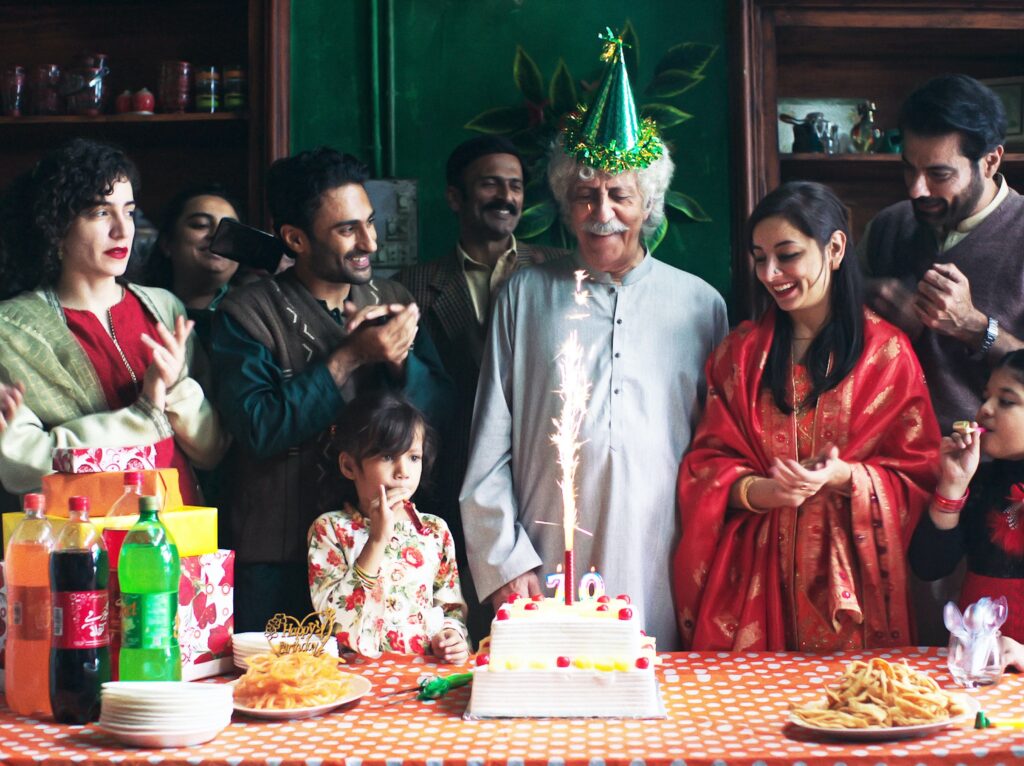A Film Praised Abroad But Shamed At Home : Joyland

© 2022 Joyland LLC
What Is the Film About?
Set in Lahore, Pakistan, Joyland is a critically acclaimed film by director Saim Sadiq released in 2022. It is the first Pakistani film to have its world premiere at the Cannes Film Festival, and won the Jury Prize in the Un Certain Regard section as well as the Queer Palm.
The film revolves around a conservative low-income family living together in a house in Lahore. Haider, the younger son of the family and his wife Mumtaz live with his father, older brother, his older brother’s wife Nucchi, and their children. Introduced by his friend, Haider starts working as a back up dancer for a transgender woman, Biba. He soon becomes fascinated by her lifestyle and struggles to balance his new life as Biba’s backup dancer and as a traditional husband and son to his family. The film also follows the stories of the two women in Haider’s house, highlighting the resilience and bravery of Pakistani women.
Most Pakistanis can find themselves relating to at least one character in this film. The untold stories of the country represented in this film evoke a sense of admiration but also a feeling of sadness for the reality of many, behind closed doors.
Censorship and Controversy
Over the past few years in Pakistan, several films have been banned after backlash from religious political parties. In 2020, the release of Circus of Life, a film about a devout Muslim man whose life is altered after a video of him dancing is leaked, was repeatedly suspended after a spokesperson from a far-right fundamentalist political party called it “blasphemous”.
After much public backlash calling “Joyland” a glorification of LGBTQ+ relationships and containing “content that is extremely offensive and clearly contrary to the standards of decency and morality”, the Pakistani government banned the release of the film. Although three censor boards had cleared the film after making some minor cuts, it was not enough to convince the minor voices campaigning against the release. The ban was finally lifted three months later after protests by the director and cast and support from Malala Yousafzai, one of the executive producers for the film, among others. The film was released and screened throughout Pakistan, except for the province of Punjab, where the film is based.
On August 17th of this year, the film was finally set to be screened in Lahore for the first time since its release 3 years ago but before the event could take place, it was cancelled as part of a crackdown that involved the arrest of several individuals after footage from a separate party that included transgender people was spread online. According to a report by the police, the video contained explicit content and a case was registered by the government.
Transgender Rights in Pakistan
Transgender people in Pakistan are afforded some rights under the Transgender Persons Act 2018. This law has been praised as “one of the most progressive legislations on transgender rights in the world” by Nadia Rahman, a Research/Policy Advisor on Gender at Amnesty International. However, instead of using that opportunity to campaign for the rights of transgender individuals, it has further enhanced a dangerous smear campaign against them.
The Transgender Persons Act 2018 provides legal recognition to transgender individuals and permits them self-identify their gender, rights to education, employment, and prohibition of discrimination. It was a groundbreaking moment for the transgender community in Pakistan and set a good example for the world to follow suit. However, in 2023, the Federal Shariat Court of Pakistan decided to revoke certain sections including the right to self-identification of gender, saying it is “incompatible with Islamic principles”
Many civil and human rights organizations along with transgender activists have expressed outrage and deep concern. Transgender women continue to be subjected to violence. According to Human Rights Watch, at least seven transgender women were killed in 2024 in the province of Khyber Pakhtunkhwa alone.
According to Dawn News, the video circulated online, renowned Pakistani fashion designer, Maria B. has stepped up her smear campaign against the transgender community, calling them “vulgar” and “immoral”, which some believe may have contributed to the government’s pledge to crackdown on “immoral activities”. The fight for transgender rights is far from over and many activists in Pakistan have been speaking out about the current situation.
Written by まりか
